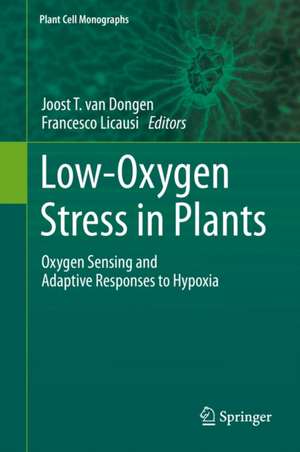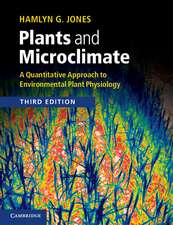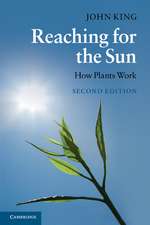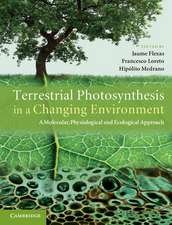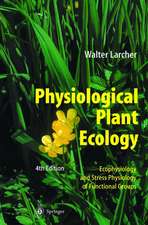Low-Oxygen Stress in Plants: Oxygen Sensing and Adaptive Responses to Hypoxia: Plant Cell Monographs, cartea 21
Editat de Joost T. van Dongen, Francesco Licausien Limba Engleză Hardback – 28 ian 2014
| Toate formatele și edițiile | Preț | Express |
|---|---|---|
| Paperback (1) | 951.29 lei 43-57 zile | |
| SPRINGER VIENNA – 23 aug 2016 | 951.29 lei 43-57 zile | |
| Hardback (1) | 956.03 lei 43-57 zile | |
| SPRINGER VIENNA – 28 ian 2014 | 956.03 lei 43-57 zile |
Din seria Plant Cell Monographs
- 18%
 Preț: 947.04 lei
Preț: 947.04 lei - 24%
 Preț: 797.37 lei
Preț: 797.37 lei - 18%
 Preț: 957.62 lei
Preț: 957.62 lei - 18%
 Preț: 943.88 lei
Preț: 943.88 lei - 24%
 Preț: 790.00 lei
Preț: 790.00 lei - 18%
 Preț: 952.89 lei
Preț: 952.89 lei - 18%
 Preț: 948.16 lei
Preț: 948.16 lei - 18%
 Preț: 950.84 lei
Preț: 950.84 lei - 18%
 Preț: 1381.43 lei
Preț: 1381.43 lei - 18%
 Preț: 942.63 lei
Preț: 942.63 lei - 18%
 Preț: 1226.73 lei
Preț: 1226.73 lei - 18%
 Preț: 952.89 lei
Preț: 952.89 lei - 18%
 Preț: 943.43 lei
Preț: 943.43 lei - 18%
 Preț: 1121.76 lei
Preț: 1121.76 lei - 18%
 Preț: 1386.48 lei
Preț: 1386.48 lei - 15%
 Preț: 634.00 lei
Preț: 634.00 lei - 24%
 Preț: 785.83 lei
Preț: 785.83 lei - 18%
 Preț: 953.20 lei
Preț: 953.20 lei - 18%
 Preț: 952.09 lei
Preț: 952.09 lei - 18%
 Preț: 950.66 lei
Preț: 950.66 lei - 18%
 Preț: 945.30 lei
Preț: 945.30 lei - 18%
 Preț: 948.79 lei
Preț: 948.79 lei - 18%
 Preț: 1231.47 lei
Preț: 1231.47 lei
Preț: 956.03 lei
Preț vechi: 1165.88 lei
-18% Nou
Puncte Express: 1434
Preț estimativ în valută:
182.94€ • 191.48$ • 152.26£
182.94€ • 191.48$ • 152.26£
Carte tipărită la comandă
Livrare economică 31 martie-14 aprilie
Preluare comenzi: 021 569.72.76
Specificații
ISBN-13: 9783709112533
ISBN-10: 3709112532
Pagini: 426
Ilustrații: XI, 426 p. 49 illus., 33 illus. in color.
Dimensiuni: 155 x 235 x 30 mm
Greutate: 0.75 kg
Ediția:2014
Editura: SPRINGER VIENNA
Colecția Springer
Seria Plant Cell Monographs
Locul publicării:Vienna, Austria
ISBN-10: 3709112532
Pagini: 426
Ilustrații: XI, 426 p. 49 illus., 33 illus. in color.
Dimensiuni: 155 x 235 x 30 mm
Greutate: 0.75 kg
Ediția:2014
Editura: SPRINGER VIENNA
Colecția Springer
Seria Plant Cell Monographs
Locul publicării:Vienna, Austria
Public țintă
ResearchCuprins
Section I. Oxygen sensing.- Sensing molecular oxygen.- Sensing the energy status.- Sensing pH Sensing ROS / NO.- Section II. Molecular responses.- Transcriptional regulation.- Translational regulation.- Section III. Metabolic responses.- Storage metabolism. Primary carbon metabolism.- Primary nitrogen metabolism.- Fermentation / Pasteur Effect.- Regulation of respiration / oxygen consumption.- Plant Hemoglobins.- Section IV. Hormonal responses. Ethylene. ABA. GA. Auxine.- Section V. Morphological adaptations. Aerenchyma.- Oxygen convection.- Elongation.- Adventitious rooting.- Mangrove.- Section VI. Ecophysiological adaptations.- Species distribution.- Underwater photosynthesis.- Survival strategies.- Radial oxygen loss.- Section VII. Agronomical and horticultural aspects of low-oxygen stress.- Fruit storage physiology.- Intensive glasshouse horticulture.- Rice (intelligent) breeding.- Section VIII. General discussion and integration chapter.
Notă biografică
Joost van Dongen studied Plant Physiology and Plant Biochemistry at Utrecht University and at Wageningen Agricultural University in the Netherlands. He received his PhD at the Utrecht University in 2001 and was a postdoctoral research fellow at the Max Planck Institute of Molecular Plant Physiology in Potsdam, Germany, from 2002 to 2006. Since 2006, he has served as an independent research group leader at the Max Planck Institute of Molecular Plant Physiology in Potsdam. His research group studies plant molecular and biochemical responses to changes in oxygen availability and the impact of beneficial root bacteria on plant primary metabolism and growth.
Francesco Licausi studied Biotechnology at the University of Parma and Plant and Microbial Biotechnology at the University of Pisa in Italy. In 2010, he completed his Ph.D. at the Scuola Superiore Sant’Anna (Italy) and Potsdam University (Germany), defending a thesis on the characterization of members of the Ethylene ResponsiveTranscription Factor Family in response to low oxygen in plants. He worked as a postdoctoral researcher at the Max Planck Institute of Molecular Plant Physiology in Potsdam (Germany) until April 2011 before moving back to Italy to serve as Assistant Professor at the Scuola Superiore Sant’Anna. The research topics studied in Francesco’s group deal with the regulation of the molecular response to reduced oxygen availability in plants and the regulation of biosynthetic pathways involved in secondary metabolite production.
Francesco Licausi studied Biotechnology at the University of Parma and Plant and Microbial Biotechnology at the University of Pisa in Italy. In 2010, he completed his Ph.D. at the Scuola Superiore Sant’Anna (Italy) and Potsdam University (Germany), defending a thesis on the characterization of members of the Ethylene ResponsiveTranscription Factor Family in response to low oxygen in plants. He worked as a postdoctoral researcher at the Max Planck Institute of Molecular Plant Physiology in Potsdam (Germany) until April 2011 before moving back to Italy to serve as Assistant Professor at the Scuola Superiore Sant’Anna. The research topics studied in Francesco’s group deal with the regulation of the molecular response to reduced oxygen availability in plants and the regulation of biosynthetic pathways involved in secondary metabolite production.
Textul de pe ultima copertă
During the last ten years, knowledge about the multitude of adaptive responses of plants to low oxygen stress has grown immensely. The oxygen sensor mechanism has been discovered, the knowledge about the interaction network of gene expression is expanding and metabolic adaptations have been described in detail. Furthermore, morphological changes were investigated and the regulative mechanisms triggered by plant hormones or reactive oxygen species have been revealed. This book provides a broad overview of all these aspects of low oxygen stress in plants. It integrates knowledge from different disciplines such as molecular biology, biochemistry, ecophysiology and agricultural / horticultural sciences to comprehensively describe how plants cope with low oxygen stress and discuss its ecological and agronomical consequences. This book is written for plant scientists, biochemists and scientists in agriculture and ecophysiology.
Caracteristici
First book describing in a detailed way oxygen stress in plants Integrates knowledge from different disciplines Gives a comprehensive overview of how plants cope with hypoxia Includes supplementary material: sn.pub/extras
